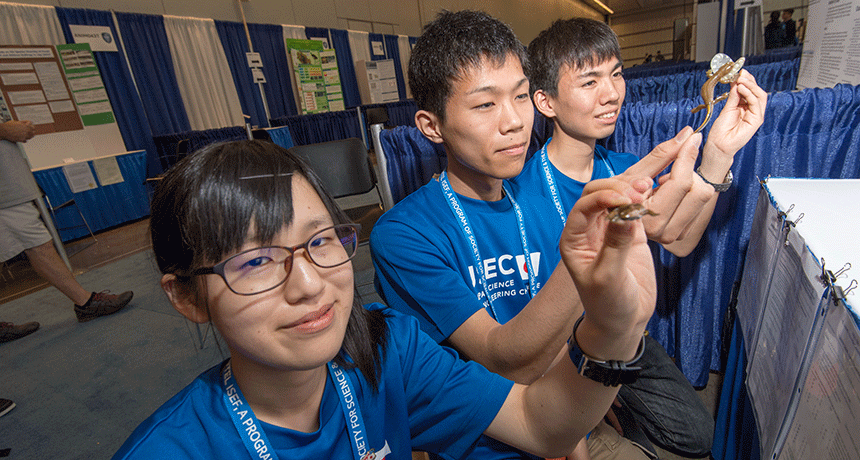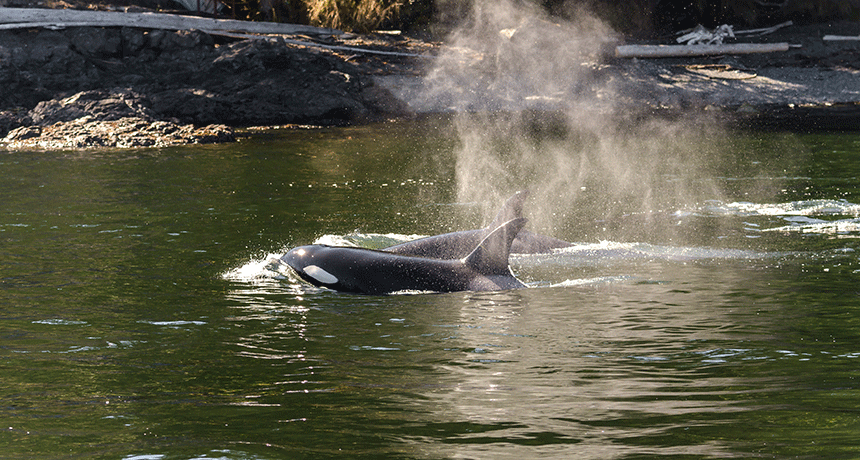HS-LS2-8
Evaluate the evidence for the role of group behavior on individual and species' chances to survive and reproduce.
-
 Animals
AnimalsHunting hidden salamanders with eDNA
The Japanese clouded salamander is an elusive beast. To find a new population, three teens turned to high-tech methods.
-
 Animals
Animals‘Boot camp’ teaches rare animals how to go wild
Animals raised in captivity cannot safely re-enter the wilds without first understanding how to find food and avoid becoming a predator’s lunch. Scientists are helping some species learn this.
-
 Ecosystems
EcosystemsSmall swimmers may play huge role in churning the seas
Hoards of migrating shrimp and krill can cause large-scale water movements in the ocean, a new study suggests.
-
 Health & Medicine
Health & MedicineScientists discover how norovirus hijacks the gut
Noroviruses make people vomit, but scientists didn’t actually know why. It now turns out that those viruses cause their misery by attacking special “tuft” cells in the gut.
-
 Animals
AnimalsOrca snot leads to a whale of a science-fair project
DNA found in the mucus of orcas suggests that even though the traits of family pods may differ, these marine mammals all appear to belong to a single species.
By Sid Perkins -
 Health & Medicine
Health & MedicineHow many ants is the best number of ants? More than one, fewer than 100
How many ants does it take to make the best decision? This teen found that four to six is just right.
-
 Animals
AnimalsChemicals from the world’s longest animal can kill cockroaches
The stuff in this sea worm’s slime can kill off green crabs, too.
By Susan Milius -
 Animals
AnimalsOcean heat waves are on the rise — and killing coral
Ocean heat waves are becoming hotter and more frequent. And one can be blamed for the 2016 coral deaths on the Great Barrier Reef.
By Dan Garisto and Carolyn Gramling -
 Animals
AnimalsIn a colony, king penguins act like a liquid
Is this a living liquid? King penguins move around within their colonies, clearing out some space, and then refilling it. That behavior resembles a liquid, scientists conclude.
By Dan Garisto -
 Animals
AnimalsFighting ‘like an animal’ may not be what you expect
Evolution has produced a broad range of conflict styles. And some of the best examples come from outside the world of the familiar.
By Susan Milius -
 Chemistry
ChemistryLight could make some hospital surfaces deadly to germs
A new surfacing material can disinfect itself. Room lighting turns on this germ-killing property, which could make the material attractive to hospitals.
-
 Animals
AnimalsAnalyze This: Electric eels’ zaps are more powerful than a TASER
Shocking! A biologist reached his hand into a fish tank and let an electric eel zap him. It let him measure precisely how strong a current it could unleash to defend itself.